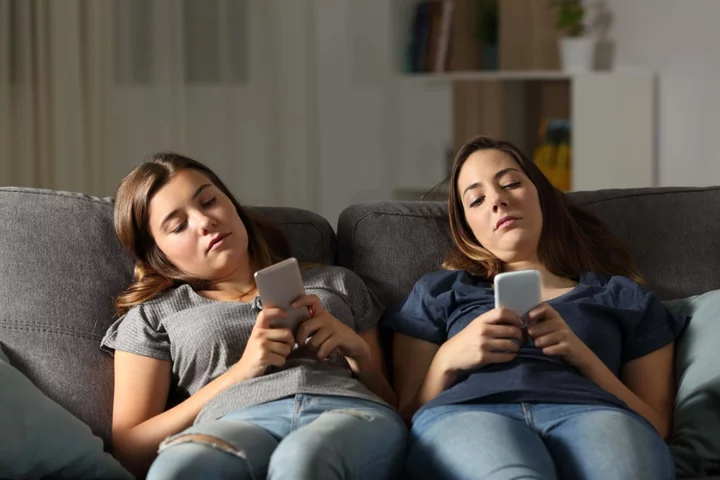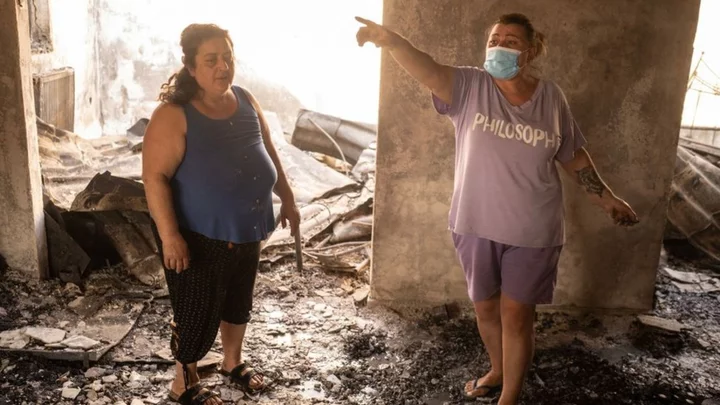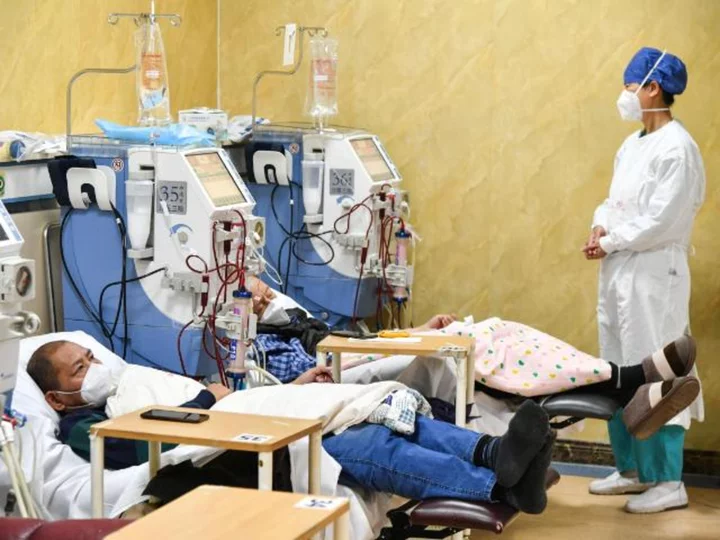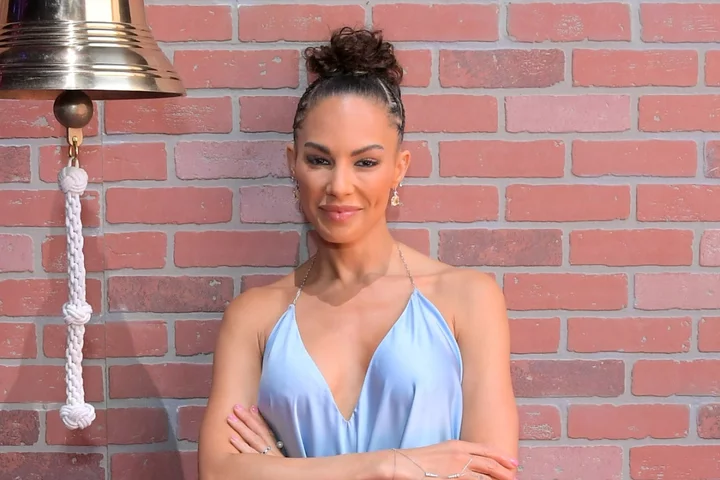
4 hacks to get teens off the sofa and get active – as study warns of heart damage
The amount of screen time teenagers get is a worry to lots of parents. And, it turns out, the health impacts of being inside and staring at a screen for long periods of time can have a serious impact on a young person’s physical health later in life. According to new research, parents should limit the amount of time children spend on social media and video games after a study found inactive teenagers are more likely to have signs of heart damage as young adults. A child may appear healthy but, even children who have a normal weight were still at risk, the study of 766 British youngsters found, after tracking them for 13 years. Academics involved in the research, which is to be published at the ESC Congress in Amsterdam, said that this heart damage could be setting the stage for heart attacks and strokes in later life. So, how can we get teens up, away from their phones and out of the house? 1. Encourage them to destress Teens may take to their screens to distract themselves from day-to-day life, watch TikToks, or aimlessly scroll – which they may see this as a form of relaxation. It might be helpful to frame exercise in the same way for stressed teens. “Young people today are facing many stress factors in their daily lives and exercise can be an important mechanism to cope and overcome such difficulties,” says Dr Triveni Joshi, consultant child and adolescent psychiatrist for Cygnet Health Care. Reiterate the benefits of exercise for their mental wellbeing too. “When you exercise, your body produces dopamine and endorphins in your brain that help you to feel good. Exercise can have a direct impact on improving mental health by reducing anxiety, depression and low mood,” she says. “Plus, exercise can give you a real sense of accomplishment and pride at having achieved a goal, thereby improving self-esteem and confidence.” Celebrate the accomplishment of just getting out and being healthy for positive reinforcement. 2. Suggest things that interest them “There is always an activity that can suit somebody,” says Joshi.”There is a range of opportunities for physical activity such as gardening, walking groups, Zumba, dancing, pilates, or swimming.” Sports like weightlifting and running are big on social media and “can improve confidence levels and tackle low self-esteem.” While being on social media may stop them from getting out, pointing towards creators who promote a healthier lifestyle may help them in the long run. Perhaps they can pair their on-screen interests and favourite creators with physical experiences. “Exercise should always be fun so often it is about finding where their interests lie and incorporating that into a healthy regime,” Joshi explains. 3. Talk to them about why they don’t want to exercise There may be a reason why your teen isn’t eager to get up and about you don’t know about, and having an open discussion may help them feel more comfortable, and build a closer bond with you. “With other pressures in their lives they may feel tired and lack the motivation to get active,” Joshi says. “A lot can depend on personality type too. Introverted children may feel shy, embarrassed, or too concerned about judgements to take part in physical activity. It might not pique their interest or they may feel it is something they aren’t skilful at and therefore don’t have the motivation for fear of not being good at something.” Getting to the bottom of why they won’t exercise may help them feel more empowered to do so, particularly if you can relate to one another and take on this challenge together. 4. Set a good example So much of our relationship with exercise is rooted in our childhood, so try to “encourage children to be active by setting the right example and being active yourself”, says Joshi. If you complain about exercise and are on your screen all the time, it sends the message that it’s normal. In trying to set a good example, you may find something you love to do together, like a specific yoga class, workout or weekly ParkRun. Read More Former royal chef explains why Prince William and Kate’s children don’t eat with them ‘You think it’s going to be a money making machine’: How modern life killed the hobby High infidelity: why do people have affairs? Why are wellbeing experts concerned about the ‘lazy girl job’ trend? Almost half of parents have ‘no idea’ how people raised children before smartphones ‘Overwhelmed’ Jennifer Lopez celebrates one-year anniversary to Ben Affleck
2023-08-25 16:29

How to protect your kids and yourself from back-to-school colds
While your child may be excited about returning to school this September, there’s also a little anxiety about the one thing that can put a spanner in the works: a cold. As Dr Dave Nichols, of MyHealthChecked, an at-home wellness testing company, puts it: “The return to school following the summer holidays often coincides with a rise in a number of respiratory illnesses, including the common cold.” Common symptoms include a cough, sore throat, nasal irritation, nasal discharge (rhinorrhoea), a fever or generalised malaise, explains Nichols. “While the common cold can affect all population groups, the National Institute for Health and Care Excellence report this to be far higher amongst children, who experience an average of five to eight colds per year.” Nichols continues: “Adults who have regular contact with children are also seen to have colds more frequently.” He says children are especially important in the transmission, acting as reservoirs for the infection as they have fewer antibodies and a more immature immune system, making them more susceptible to the common cold. “Direct contact with the skin or hand contact with an infected object are key ways the virus is transmitted,” notes Nichols. “Which explains why numbers seen amongst children are higher, as they are more likely to have close contact with each other in nursery and school.” While there is no cure for the common cold, he says prevention remains crucial in order to protect ourselves from illness. Here are some top tips to reduce the chances of catching a cold… Adopt good hygiene measures Basic good hygiene measures are an important way of reducing the transmission of viruses, says Nichols. Wash hands frequently with warm soap and water if you (or the kids) have symptoms, or have come into close contact with someone who has symptoms. He says to avoid sharing items within households, such as towels, can also help. Get into a physical exercise routine Ensuring regular physical exercise is important because it has been shown to reduce the chances of people developing viral illnesses such as the common cold, advises Nichols. “Exercise plays an important role in boosting immunity by increasing the circulation of some important immune cells, which fight against infection,” says Nichols. “It also plays a key role in helping to reduce stress and the release of stress-related hormones within the body, which has an important impact.” Eat healthy foods to maximise your wellbeing “Eating well will help support a good functioning immune system,” says Dr Emeka Okorocha, medical doctor and TV personality. “The body needs a range of nutrients and vitamins to stay strong and healthy, and prevent the development of disease.” He highlights the following vitamins… “Vitamin A, which is converted from beta carotene found in vegetables such as sweet potatoes and beetroots, is very good for helping support the mucosal lining in your nose and lungs – and helps defend against infection. “Vitamin C has always been considered a good preventative vitamin from catching colds, this can be found naturally in fruits like strawberries, blueberries, blackberries and raspberries – and in leafy vegetables like spinach as well as broccoli, peppers and peas. “Vitamin D that many of us get from natural sunlight is also ideal for overall health – and studies have shown that people lacking in vitamin D are more likely to succumb to infection.” In winter months, when there are lower levels of natural sunlight, he says you can obtain vitamin D from foods such as salmon, mackerel, eggs, and mushrooms. Berries are very beneficial Okorocha continues: “I love fresh berries – strawberries, raspberries and blueberries, for example, are high in antioxidants and contain lots of vitamin C, which helps our bodies to produce antibodies that keep us from getting sick. “Berries are also high in flavonoids which help protect cells in our immune system by promoting activation and secretory processes within cells.” He says studies have indicated that regularly eating fruits such as blueberries may decrease your likelihood of catching a cold. Get adequate rest and sleep Ensuring you’re getting adequate amounts of rest and sleep is crucial in helping to reduce your risk of becoming unwell, urges Nichols. “A healthy adult needs between seven to nine hours of sleep per night, with children requiring longer,” says Nichols. “Sleep quality has been shown to be an important predictor of immunity, with those regularly sleeping under the recommended amounts more likely to develop a cold. “Improving your sleeping pattern is therefore an important way to reduce the chances of becoming unwell.” Read More Former royal chef explains why Prince William and Kate’s children don’t eat with them ‘You think it’s going to be a money making machine’: How modern life killed the hobby People defend bride after father-in-law explains why he left wedding early 4 hacks to get teens off the sofa and get active – as study warns of heart damage Elle King opens up about her ‘deep depression’ amid two-year postpartum journey BBC Radio 2’s Tony Blackburn reveals he had sepsis and pneumonia in health update
2023-08-25 15:52

Greece wildfires: Minister calls out 'arsonist scum' as 79 arrests made
Police make 79 arrests for arson as deadly wildfires ravage the country.
2023-08-25 12:48

China is launching an 'unprecedented' crackdown on corruption in its health industry as economic woes pile up
China has launched a sweeping anti-corruption campaign targeting its hospitals, pharmaceutical industry and insurance funds as it grapples with mounting economic challenges and long-standing public frustration about high costs in the behemoth healthcare sector.
2023-08-25 10:49

88 UK deaths linked to Canada 'poison seller'
Kenneth Law is alleged to have sold lethal substance online to people in the UK, Canada and the US.
2023-08-25 08:17

EU safety laws start to bite for TikTok, Instagram and others
Nineteen large platforms have to start complying with new rules as soon as Friday or risk big fines.
2023-08-25 07:25

Elle King opens up about her ‘deep depression’ during pregnancy and two-year postpartum journey
Elle King has spoken out about suffering with a “deep depression” during and after her pregnancy. The singer, 34, took to Instagram on Wednesday (23 August) to speak candidly about her mental health, two years after welcoming her son, Lucky, who she shares with tattoo artist Daniel Tooker. Her post included different videos of herself, in which she was working out, cleaning her skin, or singing on a stage. In the caption, she went on to reflect on her weight loss journey throughout the last two years, and acknowledged that she still plans to continue her workout routine. “I am making this post to share my journey from 284 lbs at 5‘3 from pregnancy 2021 - now 2023,” she wrote. “It doesn’t happen overnight. It didn’t even happen in a year for me. In fact, it’s an ongoing still working towards ever changing goals kinda thing.” King continued her post by opening up about her mental health struggles - both during and after her pregnancy - which included postpartum depression. “I fell into a very deep depression during my pregnancy. I also didn’t even realise how intense postpartum depression is and was until I very slowly began to crawl out,” she wrote. “I felt trapped in my body.” While symptoms of postpartum depression can vary, some of them can include difficulty bonding with your baby, withdrawing from loved ones, and a loss of appetite, according to the Mayo Clinic. In her Instagram caption, King went on to explain that amid her symptoms of postpartum depression, she started working out more. She then acknowledged that she’s now seen her body get “stronger” over time. “Metabolic workouts. Light cardio to warm up my body, my lungs, my voice, and my spirit. I am a creature of habit, so I changed my f***ing habits,” she wrote. “Every few weeks I feel my body getting stronger. I add more workouts.” The “Ex’s & Oh’s” singer expressed that while she wanted to lose weight after welcoming her baby, there was “so much more” insentive since her brain “functions better on the days” that she moves her body. She also described how she’s now embraced the way that her body looks. “Some days I count stretch marks. Some days I hug myself and say thank you to my body. Today is a kind day. I’ve been tiny, I’ve been huge, BUT RIGHT NOW I’M HEALTHY,” she continued. “I can’t believe that I even have to say this, but no, I am not on any weight loss medication.” She added that she’s had a few health conditions over the years, including being pre-diabetic and suffering with Polycystic ovary syndrome (PCOS). PCOS is a condition that consists of “problems with hormones that happens during the reproductive years,” as noted by the Mayo Clinic. Symptoms can range from irregular periods to polycystic ovaries, which are “follicles containing immature eggs may develop around the edge of the ovary”. King continued her message by sharing that her “diabetic grandfather died” when she was 10-years-old, after she “watched him prick his finger and give himself shots”. She concluded by showing her support for her followers, and by sharing the goal of her workout routine, writing: “I do not judge anyone who is trying to live a healthier life. I can only share MY OWN JOURNEY! I just hope to live a long, wonderful, healthy life where I can drink a lot, eat fish, laugh as much as I can, and die happy.” This isn’t the first time that King has been open about some of the health challenges she has faced. When announcing her pregnancy in 2021, during an interview with People, she revealed that she’s had struggles with infertility, explaining that she previously suffered two pregnancy losses due to her PCOS. “It’s such a major thing that so many people go through, but it’s so secretive - like you have to go through it alone,” she said about the pregnancy loss. “Nobody talks about it. It’s like you’re supposed to feel shame; like you’re not supposed to tell people before 12 weeks, because if you lose it, it’s going to be embarrassing for you and you don’t want other people to get their hopes up. Like, holy s***.” Read More New mother filmed doing laundry seven days after giving birth sparks debate ‘It can hit everyone’: Postnatal depression is surging, and it’s still misunderstood Olivia Munn opens up about her postpartum body 20 months after giving birth Sienna Miller pregnant with her second child Serena Williams celebrates second pregnancy with ‘pre-push party’ Lisa Snowdon opens up about ‘tortured thoughts’ after abortion: ‘Was that my chance?’
2023-08-24 23:59

BBC Radio 2’s Tony Blackburn reveals he had sepsis and pneumonia in health update
Tony Blackburn has revealed that he had life threatening sepsis and pneumonia after coming out of a two-month stay in hospital. The veteran BBC Radio DJ had pulled out of his Sound Of the 60s UK Tour and accompanying radio show earlier this year after he was taken ill. At the time, Blackburn told his listeners he had a chest infection. Now that Blackburn has fully recovered and has been discharged from hospital, the DJ has revealed that he was actually suffering from sepsis, pneumonia and blood poisoning. “I was doing three a week at one time forgetting that I’m now a little bit older, so I ended up in hospital for two months with sepsis and pneumonia and blood poisoning,” he said on BBC Radio Scotland’s Afternoon Show on Wednesday (23 August). “And I didn’t realise how unwell I was until one day in the hospital my whole family were gathered around the bed. And I thought ‘this isn’t good’.” “A couple of weeks ago I went to see my specialist and he said ‘you are cured’, so that was a nice thing to hear.” After a three-month break, Blackburn has returned to his tour but will be doing one show per week rather than three per week. He said: “I haven’t been doing the [tour] show for about three months because I was told to rest a little bit. Now I’m back in form and we’re selling out.” “I love being with the band and it’s just loads of fun.” Blackburn returned to BBC Radio 2 after Johnnie Walker covered his Sounds of the 60s radio show during his illness and has since launched a new show on Sunday afternoons – Tony Blackburn’s Soul on Sunday on BBC Radio London. Back in May, Blackburn announced that he had been discharged from hospital and was looking forward to broadcasting again. “After three weeks in hospital I have just been discharged and am now at home to have some more treatment by having a daily injection for a few days from a hospital near me,” he said. “Thanks to everyone at the Wellington Hospital in London, doctors and nurses for looking after me. “After my treatment and a rest I look forward to getting back @BBCRadio2 and @BBCLOCALRADIO to doing what I love doing. Just want to thank all my friends for your lovely messages, you are all so kind to think about me xx,” he concluded. According to the NHS, sepsis is a life-threatening reaction to an infection when your immune system overreacts to an infection and starts to damage your body’s own tissues and organs. There are lots of symptoms of sepsis, and those symptoms can be similar to other conditions, including the flu or a chest infection. Read More Former royal chef explains why Prince William and Kate’s children don’t eat with them What we know about the leaked Pentagon documents on Ukraine Bride tries on mother’s wedding dress 30 years after parents’ wedding 4 hacks to get teens off the sofa and get active – as study warns of heart damage Selling Sunset’s Amanza Smith says she ‘almost died’ from spine infection Strictly’s Amy Dowden finding it ‘so hard’ as she shares hair loss update amid cancer
2023-08-24 23:16

Selling Sunset’s Amanza Smith says she ‘almost died’ after suffering from spine infection
Selling Sunset star Amanza Smith has shared an update after undergoing surgery to treat an infection that spread from her bloodstream to her spine. The interior designer, who works at the real estate company The Oppenheim Group, has revealed in a new interview how osteomyelitis, a painful bone infection, had affected her lower vertebrae. Smith, 46, discovered the infection after experiencing severe backache that lasted nearly a month. After she collapsed while at her Los Angeles home back in May, her friend encouraged her to visit the hospital. “I thought I had a backache, and I almost died,” Smith told People in the magazine’s latest issue. “The doctors and my friend saved my life.” Smith told the publication that she was given antibiotics to treat the infection but faced some complications. She underwent surgery on her lower spin to “clear the infection from the bones” but later found out that the osteomyelitis had affected another area at the front of her spine. “The risk was the antibiotics wouldn’t penetrate the bone, and my entire back could collapse,” she said. Smith had two surgeries to treat the osteomyelitis, which included having part of her spine replaced after it “deteriorated” as a result of the infection. The second operation lasted six hours, in which doctors inserted a titanium mesh cage in her back. She previously said: “Part of my spine has completely deteriorated due to the infection and I’ll be getting a new vertebrae and a couple of screws and rods in my spine to replace what has been eaten away from the bacteria.” In the new interview, she told People: “I am an iron woman, with rods and screws.” Smith returned home from hospital in early July, but her recovery period involves six months of antibiotics, physical therapy and “treading lightly on her feet”. “There are so many things I can’t do, because I can’t lift more than five pounds,” she told the publication. “Sometimes my purse is too heavy. You can’t speed up time, but I’m very anxious to be able to do the things that I love to do. I like to decorate. I like to rearrange. I want to be able to hang things, but I’m very limited right now.” Reflecting on her period in hospital, Smith said that she would never take her mobility “for granted” again. “When I can walk and jog again and do Pilates or ballet, I hope I stick to them because I plan on living to be 107,” she said. According to the NHS, osteomyelitis is a painful bone infection that usually goes away if treated early with antibiotics. However, it can cause serious long-term problems if not treated. Anyone can develop the infection, but a person may be more at risk if they have diabetes, a broken bone, a weakened immune system or recently had an infection or surgery. Smith joined Netflix’s hit reality show Selling Sunset in the second series in 2019. The show follows the drama surrounding employees at The Oppenheim Group, an elite real estate brokerage selling luxury properties in Los Angeles. Read More Queen’s service to inspire young writers in Commonwealth challenge High infidelity: why do people have affairs? Bride tries on mother’s wedding dress 30 years after parents’ wedding Revlon hits back at Selling Sunset star after she found makeup in her husband’s van Strictly’s Amy Dowden finding it ‘so hard’ as she shares hair loss update amid cancer How to help your teen with comparison culture on GCSE results day
2023-08-24 19:45

How to help your teen with comparison culture on GCSE results day
Whether your child’s GCSE results are high, low, or somewhere in between, one thing is inevitable – they’ll compare them with their friends’ grades. This comparison culture, which is far more pervasive because of social media, can leave teens feeling inadequate because their results are worse than their mates, or make their friends feel useless if roles are reversed. But although there’s no getting away from teenagers comparing their results both on and offline, what can parents do to try and limit the damage this it can cause? Former teacher Dr Julia Clements, principal educational psychologist at the children’s mental health charity Place2Be, says the comparison of results will undoubtedly impact some teenagers’ wellbeing. “Your teenager is bound to compare their results with their peers at the same school, but also through social media,” she acknowledges. “Although this comparison is inevitable, it may be harmful for your child’s wellbeing – especially if they’ve not done as well as expected. “Indeed, the term ‘compare and despair’ can be especially pertinent on days like today.” Sharon Davies, CEO of Young Enterprise, a charity which helps young people navigate the changing world of work, adds: “The pressure to measure up to their friends’ achievements can be overwhelming, leading to feelings of inadequacy or disappointment.” So how can parents help their teens? 1. Ask how they feel If your child is down on themselves and rating themselves negatively in comparison to their friends, they may reject any positives and praise parents provide, Clements warns. “It may be more useful, in the first instance, to ask them how they’re feeling, and to acknowledge and validate difficult feelings,” she advises. Such feelings may include disappointment, sadness, anger, shame, or feeling as if they’ve let themselves – and you – down. “If your child is feeling like this, it’s important to give them the message that you love them unconditionally and you’re proud and pleased to be their parent because of who they are – not because of the grades they achieve,” she stresses. 2. If they’ve done better than their friends… If your child has achieved good results, which may be better than some of their friends, then they’ll want to celebrate. But while celebrating is of course a great idea, Clements suggests: “You may want to talk with them about how to be sensitive and compassionate towards their friends who haven’t done so well.” 3. Help them turn a negative into a positive Consultant clinical psychologist Dr Nihara Krause specialises in teenage mental health and is working with the Talking Futures campaign to help parents engage their children in meaningful conversations about their futures. She says if a young person doesn’t get the grades they were hoping for, they may be highly critical of their performance in comparison to their peers. But she suggests parents show them how to turn their negative thinking around. “Parents should encourage their children to focus on recognising the approach they took to exams this time round and take steps to reflect on what they could do to achieve a better result in the future. Focus on what helps a young person gain their own personal best, no matter how their results compare with others.” 4. Don’t ask about their friend’s results or post about them Krause says parents should try to celebrate their child’s achievements for what they are and avoid asking about their friends’ results. “To avoid comparison, parents should also avoid sharing their child’s results on social media,” she says. 5. Don’t be too hard on yourself Clements points out that comparison culture may not just affect teenagers – if their results aren’t as good as expected, mums and dads might start comparing their own parenting during the revision and exam period with other parents whose kids have got better results. “As a parent or carer, you may also be drawn into unhelpful comparisons with others,” says Clements, “and you may question the amount of support you were able to provide your child in the run up to their exams. However, today is not a day for self-criticism or judgements – some self-compassion is important at this time.” 6. Reach out for support This might be the first results day many parents have gone through with their child, and while comparisons with other teens may well have been unhelpful, Davies points out that schools will have career advisers and teachers available who can offer support and advice. There are also online forums and blogs where those in similar situations share their experiences. She says: “No-one is expecting you to have all the answers – that’s why there’s support available.” Read More Charity boss speaks out over ‘traumatic’ encounter with royal aide Ukraine war’s heaviest fight rages in east - follow live Women more severely affected by ME, study claims 4 hacks to get teens off the sofa and get active – as study warns of heart damage Taking adult education classes may lower risk of dementia, study suggests
2023-08-24 13:56

Malka Leifer: Israeli ex-principal jailed for sexually abusing Australian students
Malka Leifer was convicted of abusing two pupils at an ultra-Orthodox Jewish school in Melbourne.
2023-08-24 13:27

US says stolen COVID relief funds seized so far top $1.4 billion
By Kanishka Singh WASHINGTON The U.S. Justice Department said on Wednesday it has seized over $1.4 billion in
2023-08-24 07:59
